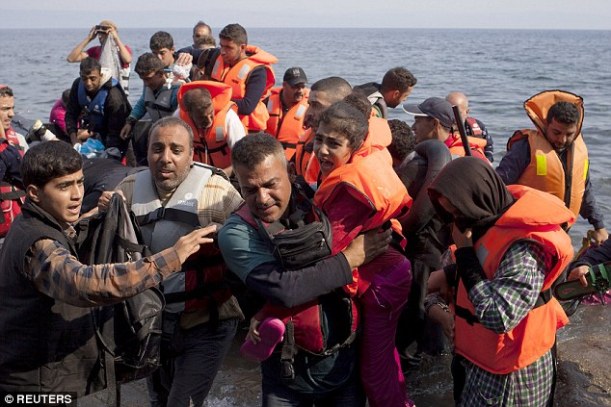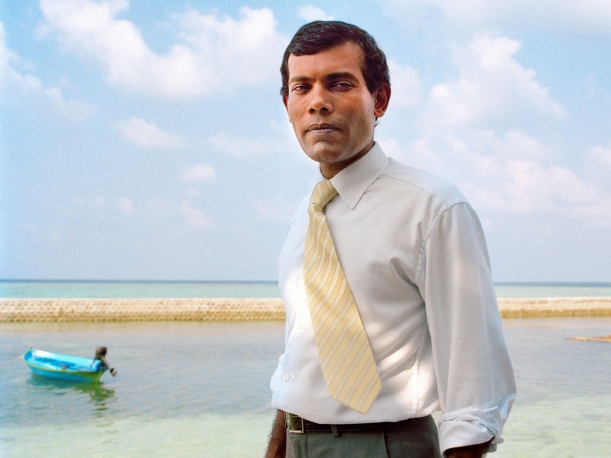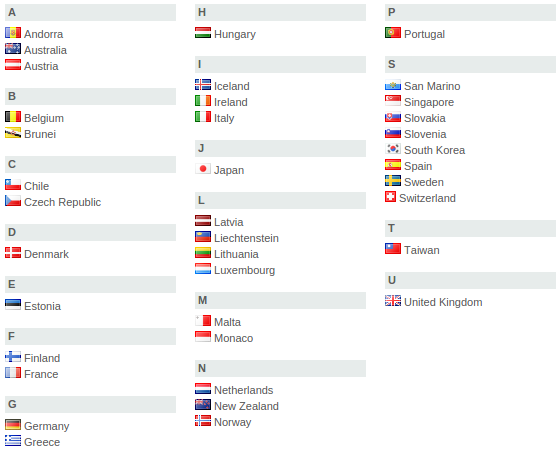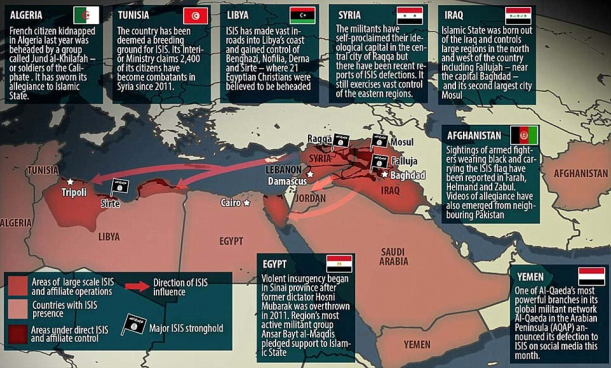Kia Roberts-Warren
“The destruction of culture has become an instrument of terror, in a global strategy to undermine societies, propagate intolerance and erase memories. This cultural cleansing is a war crime that is now used as a tactic of war, to tear humanity from the history it shares,” (Irina Bokova, head of UNSECO).[1]
The destruction and looting of art is a widespread and systematic attack to erase people’s memories and identities. The Nazis destroyed and looted hundreds and thousands of books, art, and other cultural relics.[2] Paintings were vandalized during the armed conflict between Macedonia and the National Liberation Army[3] The siege of Dubrovnik, damaging the ancient Mostar bridge, and the Sarajevo national library during the Yugoslav wars.[4]
Terrorist organizations have put destruction of cultural heritage back on the war agenda. Since ISIS’ has taken over territory in Syria and Iraq, they have destroyed and looted numerous World Heritage Sites that the group deems idolatrous and blasphemous.[5] A World Heritage Site is determined by United Nations Educational, Scientific, and Cultural Organization (UNESCO) and is defined as “belonging to all peoples of the world, irrespective of the territory on which they are located.”[6] By historical standards, ISIS’ actions in Iraq are “on a rampage of destruction not seen since the Mongol’s sacking of Baghdad in 1258.”[7]

Temple of Bel (or Baal) in Syria. The Temple was one of the main attractions Palmyra, a Roman-era trading outpost in the desert, northeast of Damascus, Syria
In Syria, ISIS has destroyed the ancient cities of Palmyra, Mar Elian Monastery, Apamea, Dura-Europos, and Mari.[8] In Iraq, ISIS has destroyed the oldest Christian monastery (Dair Mar Elia), Assyrian Empire artifacts in the Mosul Museum, Nineveh archeological site, razed the Tomb of Jonah and other religious sites, Nergal Gate (an entrance to the ancient Assyrian city of Nineveh, where the men use power tools to destroy a pair of massive statues of winged bulls with a human heads), and the Nimrud archaeological site.[9]
Moreover, the Sunni Muslim library, the Mosul Museum Library, and the library of the 265-year-old Latin Church and Monastery of the Dominican Fathers have also been heavily damaged. These libraries contained collections from the Ottoman Empire, Iraqi newspapers from the early 20th century, and other ancient texts were burned in the streets.[10] Irina Bokova stated that it was “one of the most devastating acts of destruction of library collections in human history.”[11] (You can see video here)
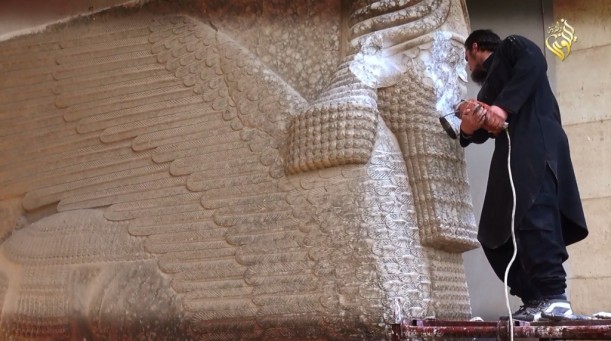
A member of ISIS destroying an ancient Assyrian lamassu (screenshot from an ISIS propaganda video)
Intelligence officials say looting is the terror group’s second largest source of income after oil.[12] ISIS encourages civilians to plunder historic sites and then charges a 20 percent tax on anything they sell.
Last February the UN Security Council adopted a new resolution, UNSCR 2199, which was drafted by Russia and co-sponsored by the United States.[13] The Resolution prohibits the trade of artifacts illegally removed from Syria since 2011 and Iraq since 1990.[14] The UN General Assembly, also, passed a resolution called “Saving the Cultural Heritage of Iraq,” which states that ISIS’ actions may amount to war crimes as well as details about ISIS’s attacks on cultural heritage sites and demands its members be stopped and held accountable.[15]

In the wake of ISIS’ cultural destruction, Italy has teamed up with UNESCO to create a task force.[16] This task force called The Peacekeepers of Culture, will be a 60-person team of art detectives from the art-squad police from Italy’s Carabinieri military police, historians, and Italian-trained restoration experts.[17] The goals of the peacekeepers are to protect ancient artworks, artifacts, and archaeological sites in conflict zones from extremists, protect against “cultural cleansing” and the fear-mongering propaganda, and to cut off some of the Islamic State’s funds acquired through the sale of looted artifacts, statues, and other antiquities on the black market.[18] It will establish facilities in Turin, where it will train cultural heritage protection experts. It aims to “assess risk and quantify damage done to cultural heritage sites, develop action plans and urgent measures, provide technical supervision and training for local national staff,” as well as help move some objects to safety.[19] The task force has not chosen a country for its first mission but is ready to go where UNESCO sends them.[20]
In April 2013, the Smithsonian Institute created the Safeguarding the Heritage of Syria and Iraq (SHOSI) Project. It provides emergency preservation work, conservation materials, and training to Syrian and Iraqi museums to help salvage damaged collections and sites.[21] In the summer of 2014, SHOSI held an emergency workshop in Syria. One of the missions was to provide equipment and supplies for workshop participants to secure the immovable mosaics collection at the Ma’arra Museum in Idlib Province. This museum housed one of the most important collections of third-to-sixth century Roman and Byzantine mosaics in the Middle East.[22]
This may seem to be weak enforcement on the part of the international community. However, destruction of art is as war crime under the Rome Statute of the International Criminal Court (ICC). Article 8 (2)(b)(ix) states: “Intentionally directing attacks against buildings dedicated to religion, education, art, science or charitable purposes, historic monuments, hospitals and places where the sick and wounded are collected, provided they are not military objectives.”[23]

Ahmad al-Faqi al-Mahdi, on trial at the International Criminal Court in The Hague
The ICC is currently hearing its first ever war crime trial addressing the destruction of cultural heritage.[24] Malian Jihadi leader, Ahmad al-Faqi al-Mahdi is accused of destroying ancient mausoleums in Timbuktu, specifically, medieval shrines, tombs of Sufi Saints, a 15th century mosque and over 4,000 ancient manuscripts were lost or destroyed all which were considered World Heritage sites.[25] This case is considered to be an important case at the ICC in fighting against war crimes directed at cultural heritage.[26] The last time a case like this was brought to trial was in 2013 when Balkan warlords were charged with the shelling Dubrovnik in the early 1990s, damaging the ancient Mostar bridge, and the Sarajevo national library by the International Criminal Tribunal for the former Yugoslavia (ICTY).[27]
When we think of atrocious crimes committed by ISIS, destruction of art and cultural sites are not on the list. We think of targeting civilians, rape, and general pillage. However, it is important because these sites aren’t just the destruction of Iraqi or Syrian history, but, rather history that belongs to the world. These artifacts and sites cannot be repaired or replaced. Once they are destroyed, they are gone completely. To let them perish at the hands of terrorists cannot go unpunished or unnoticed any longer.
Kia Roberts-Warren is a 2l at UB Law. She is concentrating in international law and business law. Kia graduated from Temple University receiving a BA in East Asian Studies during that time she spent a semester in Tokyo, Japan. Kia has an interest in private international law particularly trade and business as well as public international law. She also interested in fashion law and art law in the international context. Last spring, she was an extern at the Hudson Institute, a think-tank in DC that deals mainly with national security issues. Kia is currently the Career Development Director of ILS and recently participated in the 2016 Philip C. Jessup Moot Court Competition. She also plans on attending the Aberdeen Summer Abroad Program this summer.
[1] http://saudigazette.com.sa/world/mena/this-map-reveals-full-extent-of-daeshs-cultural-destruction/
[2] http://saudigazette.com.sa/world/mena/this-map-reveals-full-extent-of-daeshs-cultural-destruction/
[3] http://www.dailyevergreen.com/news/article_38faf3bc-da91-11e5-a5e1-fb5b07906df6.html
[4] https://news.artnet.com/art-world/icc-cultural-destruction-trial-timbuktu-mausoleums-437882
[5] https://news.artnet.com/art-world/icc-cultural-destruction-trial-timbuktu-mausoleums-437882
[6] http://whc.unesco.org/en/about/
[7] http://saudigazette.com.sa/world/mena/this-map-reveals-full-extent-of-daeshs-cultural-destruction/
[8] http://news.nationalgeographic.com/2015/09/150901-isis-destruction-looting-ancient-sites-iraq-syria-archaeology/
[9] http://nymag.com/daily/intelligencer/2015/03/isis-destroys-ancient-art.html#
[10] http://nymag.com/daily/intelligencer/2015/03/isis-destroys-ancient-art.html#
[11] http://nymag.com/daily/intelligencer/2015/03/isis-destroys-ancient-art.html#
[12] http://hyperallergic.com/183201/un-security-council-takes-aim-at-isis-antiquities-trafficking/
[13] http://hyperallergic.com/183201/un-security-council-takes-aim-at-isis-antiquities-trafficking/
[14] http://hyperallergic.com/183201/un-security-council-takes-aim-at-isis-antiquities-trafficking/
[15] http://hyperallergic.com/210944/un-says-isiss-cultural-destruction-may-amount-to-war-crimes/
[16] http://hyperallergic.com/276208/italy-and-unesco-establish-task-force-to-protect-cultural-heritage-in-conflict-zones/
[17] http://hyperallergic.com/276208/italy-and-unesco-establish-task-force-to-protect-cultural-heritage-in-conflict-zones/
[18] http://hyperallergic.com/276208/italy-and-unesco-establish-task-force-to-protect-cultural-heritage-in-conflict-zones/
[19] http://hyperallergic.com/276208/italy-and-unesco-establish-task-force-to-protect-cultural-heritage-in-conflict-zones/
[20] http://hyperallergic.com/276208/italy-and-unesco-establish-task-force-to-protect-cultural-heritage-in-conflict-zones/
[21] http://unitetosave.si.edu/projects/response/
[22] https://global.si.edu/success-stories/safeguarding-cultural-heritage-syria-and-iraq
[23] http://legal.un.org/icc/statute/99_corr/cstatute.htm
[24] https://news.artnet.com/art-world/icc-cultural-destruction-trial-timbuktu-mausoleums-437882
[25] https://news.artnet.com/art-world/icc-cultural-destruction-trial-timbuktu-mausoleums-437882
[26] https://news.artnet.com/art-world/icc-cultural-destruction-trial-timbuktu-mausoleums-437882
[27] https://news.artnet.com/art-world/icc-cultural-destruction-trial-timbuktu-mausoleums-437882




